With a considerable readership, the best blogging platform can be the difference between an online dream and living it altogether. There exist too many options, and it is important to choose a wise platform that fits your objectives, technical-comfort level as well as fanciness. Others are less experienced rather than beginners, and they have drag-and-drop as well as customization and user-control options.
An effective blogging platform must enable you to construct and administer material tool altogether and settle on search engine optimization apparatus to gain elevation and integrate with special tools, such as social sharing or email marketing. You either need more simple platform, monetization, creativity, or input audience, and in any case, there is a platform to serve your purposes.
Most of the blogging sites such as WordPress, Blogger, wix, medium and squarespace are popular with their own benefits which differ in features either being free or otherwise at the cost of its worthiness in blogging. In 2025, the tendency is shifted to the platforms that enable mobile optimization, quick loading speed, and smooth work with multimedia tools.
This tutorial will explore the best blogging platforms of 2025 to help you choose the one that best fits your goals—whether it’s building a personal brand, sharing your passions, or boosting your online visibility quickly. So, what makes each platform unique, and which one stands out as the best choice today? Let’s dive in and find out.
What Are the Components of the Best Blogging Platforms?
- Ease of Use: The interface can be characterized as an easy to use design where you can start blogging without requiring skills in code.
- Customization Options- Flexible themes and designing elements making it convenient to adapt to your individual or brand style.
- SEO Tools – Incredible tools to aid in the optimization of your blog to search engines, and to see improvement in these searches.
- Monetization Support – Support of adding advertisements, affiliate links or sale of products or services.
- Responsive Design Mobile-friendly templates so that the user has the best experience on every device.
- Content Management : Makes arranging posts, categories, tags, and media very effective.
- Support and Community – Community of active users or support to address technical problems.
- Integration abilities – Integration with social media, email promotions, analytics and plug-ins.
List of 15 Best Blogging Platforms for 2025
1. WordPress.org
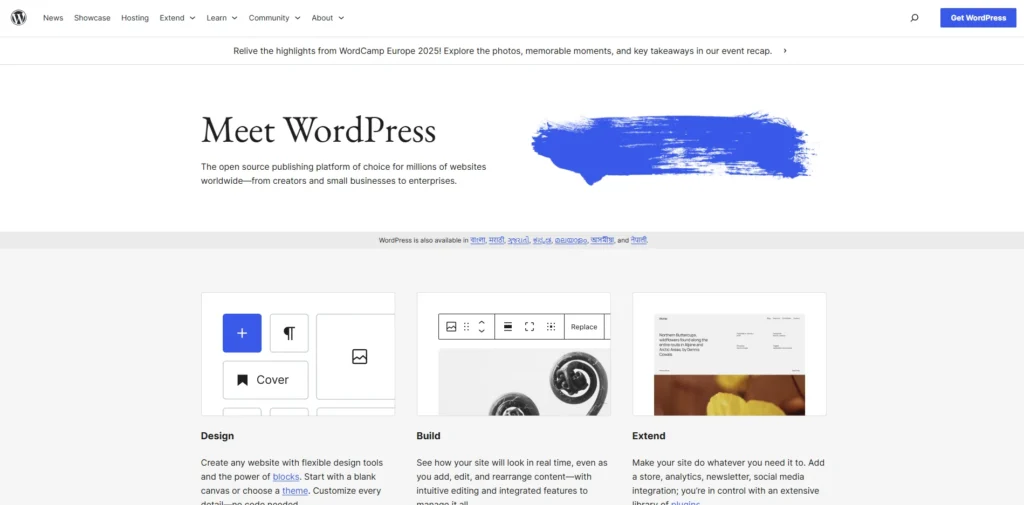
It is a well-known fact that WordPress.org is the most popular tool among blogging sites in the world and is used in more than 40 percent of websites worldwide. It has a well-known open-source flexibility, which means that you can have everything under your control when creating your blog. It is perfect for bloggers, developers, and businesses requiring full customization along with scalability. WordPress.org comes ready to build anything and everything, whether it is the most basic of personal blogs, a comprehensive online shop, or a news portal—with thousands of free and paid themes and available plugins.
However, customers must purchase a domain name and hosting separately. Although a steeper learning curve can be said about it in comparison to the drag-and-drop builders, it is worth it because of the unmatched level of creativity freedom and control over SEO, monetization, and the way your websites and sites work. WordPress.org is a proven option, especially when I want to take blogging seriously and have it as my long term professional presence.
Key Features:
- Open-source fully controlled
- There are thousands of themes and plugins
- Captive SEO instruments and personalization
- Supports any way of monetization
- Mobile-responsive themes
- Scalable to any size of the blog
- Integration with analytic and marketing tools
Pros:
- Highly customizable
- No platform censorship
- Healthy community and support
- Performance optimised /SEO
- Perfect target of monetization
Cons:
- Has to be hosted independently
- Expertise required
- Frequent repairing needed
- May be too demanding to novices
- There can be an addition of expense in terms of paid themes/plugins
Pricing:
- Personal: ₹160/ month
- Premium: ₹280/ month
- Business: ₹640/ month
- Commerce: ₹1152/ month
2. Wix

The Wix blogging interface is easy to use with its usual drag-and-drop web designing capabilities and elegant designs. Its simple point-and-click interface supports blogging on an easy-to-use website without coding. It is perfect for small companies and people to create their own personal blogs. It has more than 800 designer templates that can be customized by users according to their requirements. Some blogging tools are categories, tags, scheduled posts and there is an in-built comments system.
Wix also boasts in-located SEO tools, mobile optimization and the ability to manage media in order to increase the interaction with the content. Although the in-built system of Wix is incredibly convenient, it scored low on scalability and flexibility as compared to open-source systems. The free site is branded by Wix and also has fewer site features, thus, upgrade to a paid version is usually required when a person is doing serious blogging. Nevertheless, it is an excellent pick among amateur users who can take their new blog online in their own hands in the shortest terms possible and as beautiful and functional as possible.
Key Features:
- Drag-and-drop editor
- More than 800 editable templates
- Inbuilt SEO tools
- Mobile-optimized designs
- Market of added features in apps
- Categories and tags of blogs
- Scheduled publishing
Pros:
- Extremely user-friendly
- No need to code
- Fast setup
- Templates that are attractive Visually
- It is good on personal or business blogs
Cons:
- Lack of design flexibility post publication
- Less control backend functions
- Wix ads come with free plan
- Not suitable to big-scale blogging
- Paid plans are costly to acquire
Pricing:
- Light: $17/ month
- Core: $29/month
- Business: $39/ month
- Business elite: ₹1800/ month
3. Medium

Medium is a blogging platform that focuses on the content of the written material rather than the technical set up and design. It provides a minimal writing experience that eliminates distractions associated with it, an experience that is ideal in thought leadership, narrative storytelling, and work-related journalism. Using Medium, bloggers only need to write and the platform does the formatting, hosting, and SEO on their behalf. It also has a Partner Program where the writers get a chance to earn money depending on the interest of the subscribers of Medium—making it a potential avenue for those exploring the business opportunity through content creation.
But Medium does not provide a lot of customization and branding possibilities an opportunity to make your own blog on a Medium platform comes to the fore. This is not as ideal to someone who seeks to create a special site or one that will earn big revenues not under the Medium banner. Nevertheless, it is one of the finest platforms to receive exposure and ease in being a writer.
Key Features:
- Cleared distraction free writing interface
- Included recommendation engine and built in audience
- Monetization in the medium partner program
- Automatic SEO and mobile optimizing
- No technical preparation required, no hosting required
- Highlight and commenting police on articles
- Offers custom domain to paid users
Pros:
- It is very user-friendly.
- Exceptional publicity to emerging authors
- Promotes good writing
- The option of monetization is inbuilt
- Maintenance-free and hosting-free
Cons:
- Not much freedom in design and branding
- It is hard to develop personal branding
- Posts that sit on Medium only
- There is no flexibility of integration or plugin
- It relies on medium algorithm to monetize
Pricing:
- Medium member: $5/ month
- Friend of medium: $15/ month
4. Squarespace

Squarespace is a comprehensive platform, which provides stunning design templates, and a clean user portal, as well, thus sensational suits bloggers, artists and small entrepreneurs. It has a great blogging feature that supports media-rich content such as picture, galleries and video, and allocates it with ease, to enable the user to write a very attractive blog. Squarespace has built-in SEO optimization, mobile optimization, analysis, and e-commerce, which is why they offer great flexibility to people who prefer more than a blog.
It does not require any coding skills and hosting comes at the price package. It is simpler and less flexible than WordPress, but instead it lets you be less creative with the templates that are well-polished. The pricing is slightly more expensive than the alternatives are, and the integrations of third-party apps are less. Nonetheless, Squarespace is a good option when it comes to stylish and professional looking online presence which could be done with minimal effort.
Key Features:
- Awards winning, responsive themes
- Incorporated blogging and scheduling facilities
- SEO and analytics were in there as well
- Single hosting and domains services
- Product selling support using e-commerce
- Simple drag-and-drop customisation
- Round the clock customer care
Pros:
- Beautiful, business designs
- There are no technical skills required
- Creatives and brands are great
- Safe and stable hosting
- In-built SEO and also analytics
Cons:
- Restricted amount of customization
- No free (only trial)
- Less number of plugins and third party applications
- Can cost an arm and a leg in the long run
- The system of exporting content is challenging
Pricing:
- Personal: $16/month
- Business: $23/ month
- Commerce: $28/ month
- Commerce: $52/ month
5. Contentful
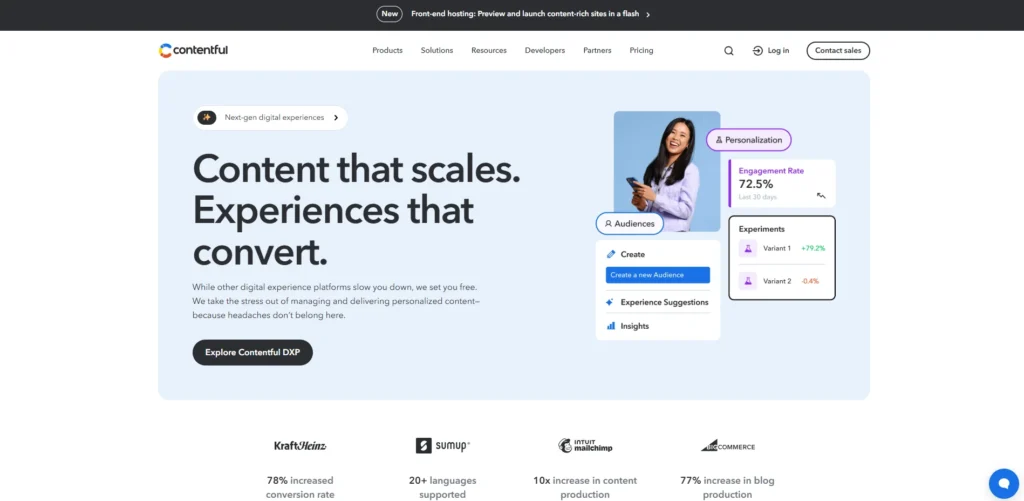
Contentful is a headless CMS (Content Management System) coupled with layer by layer control in format and presentation of blog or site content by developers and their teams. However, unlike conventional blogging systems, Contentful decouples content and design creation, so developers can present Contentful blog-content through various platforms and devices (such as websites, apps, and other devices) connected through API. It is perfect in case of tech companies, ventures and projects that require flexibility and scalability.
Marketers and writers can continue to utilize the user-friendly content editor whereas developers utilize front-end rendering using the React or Vue function or angle. Massive Contentful is not made to support lone bloggers or to those who lack technical skills because it involves setting up, hosting, and developing. Nevertheless, Contentful dominates as a first-rate pick in case teams seek content-first options with worldwide availability and contemporary design.
Key Features:
- API first headless CMS
- Fields and custom content models
- Muette plusieurs canaux (web, mobile, IoT)
- Media and rich text provision
- RBAC
- Fits in the contemporary front-end frameworks
- Enterprise and scalable
Pros:
- Very dynamic and elastic
- The ideal design of delivering omnichannel content
- Elegant separating of added content VS design
- Good API and development tools
- Made specifically to fit teams and large organizations
Cons:
- Developer-required setup
- No in-built front-end or designing tools
- High learning curve to non techs
- More than necessary to write a blog
- Small projects can be expensive to pay monthly plans
Pricing:
- Lite: $300/ month
- Premium: custom
6. Ghost
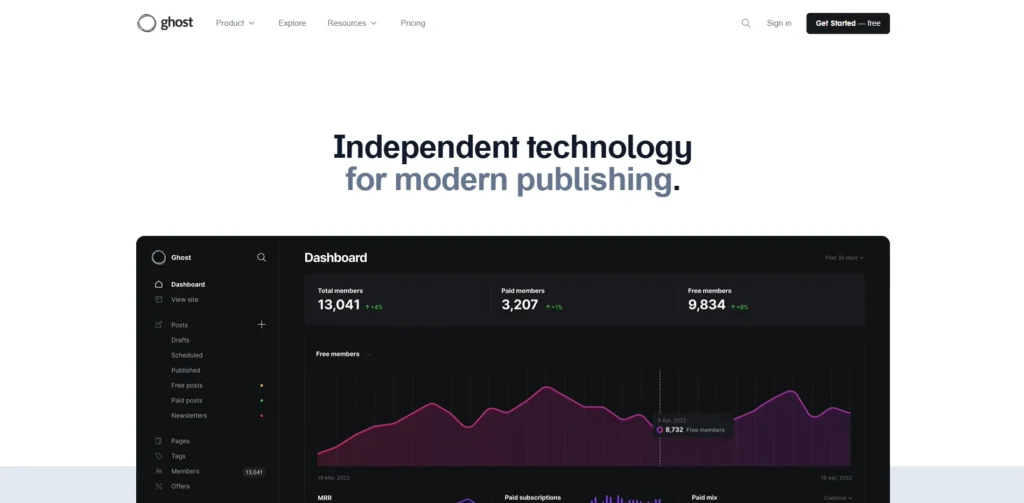
Ghost is a new open-source publishing platform centred on professional publishing, speed and content monetisation. It is ideal among self-writers, reporters, and individual publications that desire a minimal yet responsive experience of writing to match with potent features. Ghost is quite effective because it was built using Node.js. It has inbuilt features of SEO, subscription of members, newsletters, and charged content, enabling bloggers to earn money directly without using advertisements.
Self-hosted, along with fully managed (Ghost Pro) plans are available on the platform. Although it is by no means as newcomer-friendly as Wix or Blogger, tech-savvy individuals and those serious about writing will surely enjoy its minimalistic design, use of Markdown editor and its privacy-focused nature. Themes and integrations allow the customization but this is done at a more technical level. All in all, Ghost seems perfect for anyone who desires a cool writing platform and has monetization tools embedded into it.
Key Features:
- Spotless, clean design that is distraction-free and uses Markdown
- Membership and subscription systems that are inbuilt
- Newsletter tools and native SEO tools
- High-speed with Node.js
- Self-Managed or managed Alternatives
- Personalized themes and platforms
- Plain privacy, no advertisements out of the box
Pros:
- Ideal paid stuff, subscriptions
- Speedy and feathery
- No programming required to use it at all basic point
- Devotedly concentrated on publishing
- Suitable to self-writers
Cons:
- Needs technical configuration when self installed
- Less themes, and less plugins than WordPress
- Push not suitable in non-publishing websites
- Poor drag-and-drag design features
- It can be also expensive, in paid version
Pricing:
- Personal: $10/ month
- Advanced: $30/ month
- Team: $100/ month
- Bussiness: $250/ month
7. Weebly

Weebly is a user-friendly website builder and has decent blogging features, making it an ideal choice among blogging sites, especially for users who wish to have a hassle-free way to create websites and blogs. The Weebly built-in e-commerce capabilities and pricing are similar, but the site belongs to Square, which happens to be a useful tool when bloggers want to sell things as well as content. It has a drag-and-drop editor that is easy to understand and also offers pre-designed themes that are responsive to mobile devices. It is possible to control blog posts, schedule them, and add categories or tags.
Weebly does have built in SEO preference as well as analytics and host services which is free. But it is not as customisable as WordPress or Ghost, nor is it as free as its advanced users might want. However, Weebly provides a simple and uncluttered blogging interface enhanced with commercial features for small business owners, hobby bloggers, and amateur users.
Key Features:
- Site and blog creator using drag-and-drop
- Mobile-responsive themes
- Embedded SEO and analytics In one way or the other this is quite acceptable as it is convenient to install built in SEO tools that help in analyzing the traffic.
- A category support and scheduling of blogs
- Built in e commerce
- It had free hosting
- Added features are available in app center
Pros:
- It is very simple to handle, and it may be used by those who are beginners.
- Blog + store works perfectly with it
- Easy installation with zero codes
- Free plan is offered
- Good after sales services
Cons:
- Lack of flexibility in designing
- Very little advanced blogging tool
- Basic app integrations
- It is challenging to export blog material
- Unsuitable to complicated blogs
Pricing:
- Personal: $10/ month
- Professional: $12/ month
- Performance: $26/ month
8. Substack
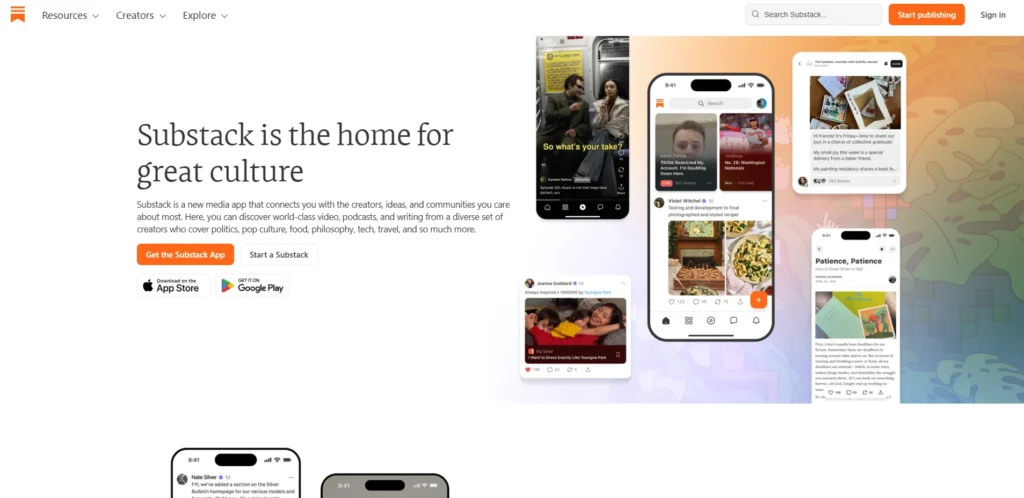
Substack is a fast-growing platform suitable to writers who seek to create a blog and an email newsletter under the same roof. It enables producers to release content and delivery them directly to the subscriber inbox with optional paid subscriptions. Authors do not have to think of hosting, technicalities, or design; they can just write. Substack is very beneficial to independent journalists, bloggers, and thought leaders who want to make money from their writing because it pays creators, guarantees the delivery of subscriber data, and provides analytics tools for subscription-based creators.
The user interface is straightforward and pretty, and it does not require any initial investment, as Substack does not require any fee just a share of the revenues. But you have little control over it and you have restricted branding and a few customization capabilities and you are stuck in the Substack system. Substack is among one of the most contemporary platforms to grow an audience and write newsletters and long-form pieces.
Key Features:
- The combination of Newsletter and blog publishing
- Facilitates paid and free subscriptions
- No hosting and technical configuration needed
- Clear easy to navigate writing interface
- Inbuilt Analytics and subscriber management
- Substack manages payments Substack does payment processing
- New reader community discovery aids New readers
Pros:
- Easy and elegant interface
- It is perfect to monetize directly to readers
- Zero entry bars
- Integrated Mail newsletter application
- Perfect to be a self-producer
Cons:
- Very little design and branding
- Platform makes a deduction of revenue
- Little customization mechanism
- No advanced integrations and plugins
- Substack does not fully own content where it is hosted
Pricing:
- Not Available
Also Explore: Free Canva Alternatives
9. Tumblr
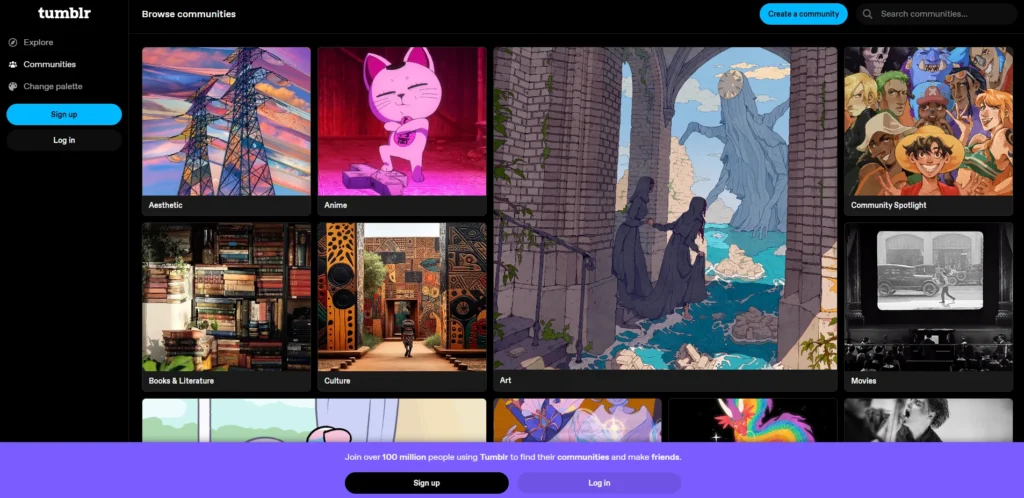
Tumblr is a social networking and microblogging platform that combines the ease of blogging with the virality of social differentiation. It is perfect for users wishing to share short pieces, images, GIFs, videos, and memes with a considerable amount of online users. Tumblr also has a younger creative audience, fandom following, as well as people just into visual storytelling. It is free, installing is easy and themes (which contain personal branding features) are customizable.
Tumblr has the ability to follow other blogs, to reblog content and it can react to it with likes and comments, which gives Tumblr the feel of a more social platform in comparison with traditional blogs. Although it is not appropriate to long-form and direct blogging because of low SEO and introverted abilities, it is excellent in community engagement and making choices. Tumblr is an excellent solution to those bloggers who are hobbyists, creative artists, and everybody familiar with a loose, uncritical online environment.
Key Features:
- Format for short-form content The short-form content is produced using the microblogging format.
- Built in social features (likes, reblogs comments)
- No charges and fast installation
- Multimedia friendly (GIFs, images, Video)
- The customization of the theme Themes are changeable
- Tag based discovery of contents
- Online application to post on the go
Pros:
- Sociable and communicative
- It is perfect in visual and expressive content
- Full time open access There is no fee to use it.
- Convenient and comfortable to operate Easy accessible and convenient to manage
- Good vibe of the community
Cons:
- Few SEO and monetizing gadgets
- Less fit to be professional bloggers
- Personalization can be a little awkward
- On the free blogs, ads can be put up
- Unsuitable to be used by business people
Pricing:
- Redemption fee of $80.00
Also Read: Cloud Security Posture Management Tools
10. Jekyll
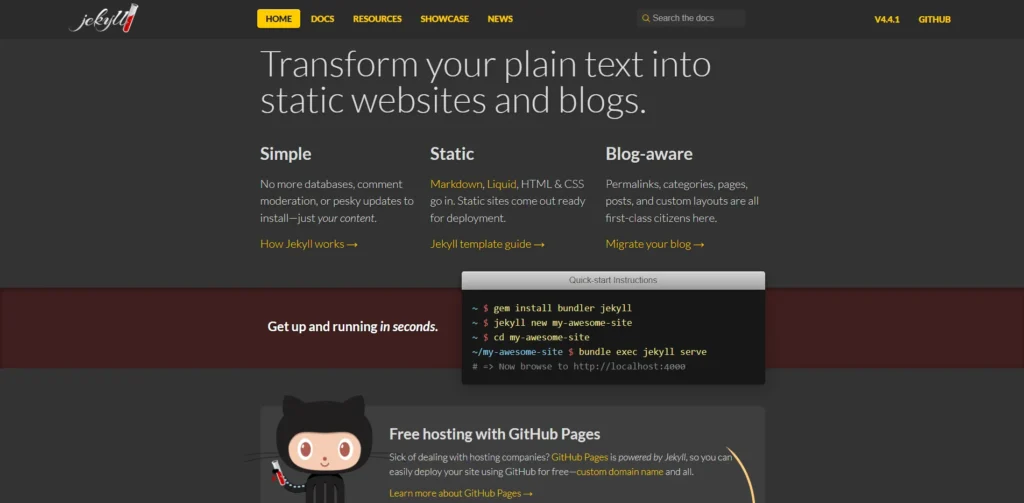
Jekyll is a static site generator that is ideal to advanced programmer/technical bloggers who feel more comfortable creating their content in the Markdown format and running everything by using git. It reads text files, renders them into static HTML pages and serves it up without any fuss, notably via GitHub Pages where you can even publish your blog gratis. The program allows you to take complete control over the structure, design, and performance of your site, so Jekyll will be a good choice of you are a developer or somebody who does not fear code.
It is very quick, safe, and does not need a conventional database, which saves the issue of attacks or slow-downs. Jekyll requires, however, some knowledge of the command line, Git, and some basic understanding of web development, and Jekyll is not really DE novice-friendly. It also does not have much plugin support as WordPress. However, Jekyll is a very effective platform when it comes to minimalist bloggers who look forward to speed, control over version and ease of architecture.
Key Features:
- Markdown to Static HTML converters
- GitHub Pages free hosting
- Very quick and light
- Intense security without any database required
- Git full version control
- Liquid templating by custom layouts
- Perfect developers and tech blogs
Pros:
- Blazing-fast performance
- Able to be used and hosted at no cost
- Quite secure (no dynamic content)
- Complete codification
- Technical blogs are good with it
Cons:
- Sharp learning curve
- Not to non-technical peoples
- No in-built GUI or CMS
- Manual centric updates
- Weak plugin ecosystem
Pricing:
- No direct pricing plan
11. LinkedIn Articles
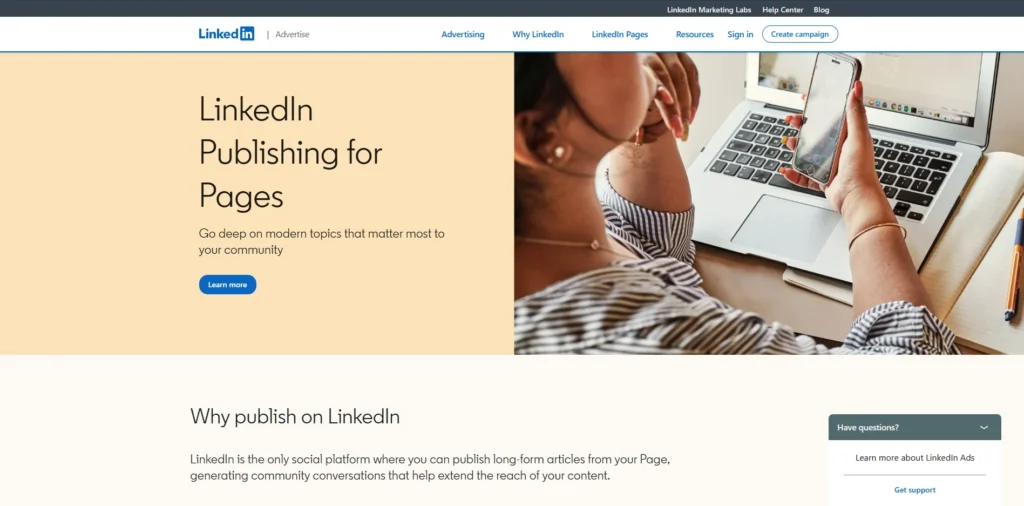
LinkedIn Articles is an in-built blogging engine on the LinkedIn website that allows professionals to publish knowledge, industry news and thought leadership material on LinkedIn. It is not a blogging standalone site but a wonderful means to reach a professional audience, particularly B2B operations. The feature enables users to post long-form content right out of their profile, and the content becomes immediately visible to the user and the user is connected with. It does not require any setup or hosting, you log in and write.
Types of contents such as images, videos, and hyperlinks are permitted with linkedin articles and thus make it more enjoyable to content. Nonetheless, it does not have any sophisticated customization, design, and monetization capabilities. It works best as a side platform, to enhance credibility, personal brand and authority within a certain area. LinkedIn Articles are a content marketing tool to professionals, consultants and business leaders in an environment of a trusted network.
Key Features:
- Pin long articles right on LinkedIn
- Auto posting to your network
- Accepts pictures and videos, links
- No hosting/set-up indeed needed
- Very good B2B exposure and branding
- Combined audience analytics
- Assists in the increase of professional credibility
Pros:
- In-built expert audience
- No technical ability is required
- It builds personal brand
- Sharing and involvement Easy sharing and engagement
- Perfect networking
Cons:
- Few choice of design and layout possibilities
- No monetizing options
- LinkedIn platform associated content
- No blog tools of organization (categories/ tags)
- Not quite suitable with long term content control
Pricing:
- Career plan: 1 month free then₹ 999/ month
- Business: ₹1999/ month
- Sales navigator core: ₹8900/month
- Recruiterlite: ₹8400/ month
12. HubPages

HubPages is a sharing and revenue generation site which gives writers an opportunity to publish articles (what they call Hubs) on any topic including lifestyle to finance. It is geared toward writers who are eager to earn money out of their work but do not want to create a complete web resource. HubPages give their writers advertisement income and affiliate traffic which is a source of passive income as long as those who read your work log into your page.
The site provides an in-built following and audience, thereby allowing emerging articles to get recognized in good time. HubPages handles the technical stuff—you do not need to concern yourself with hosting, design, or setting up search engine optimization. Nonetheless, it does not allow much customization and branding, and the content belongs to the HubPages network and not your blog. HubPages provides a good entry point to writers interested in monetizing their content and generating exposure without having the bother of maintaining a site, making it a convenient choice among blogging sites.
Key Features:
- Write and publish on various fields
- Integrated capitalization through advertisement and affiliates
- As easy as no hosting and no setup is needed
- Content discovery by community
- Moderation and editorial comments
- Plain WYSIWYG editor
- Revenue sharing model
Pros:
- Excellent to get passive income
- It is simple to put pen on paper right away
- There is no require of tech skills or web site
- In-system readers base
- Content can be improved through editorial support
Cons:
- Little design and branding control
- Incomes are based on traffic and clicks of ads
- Serious policies on content
- The hosted content on your HubPages and not on your domain
- Not so good when it comes to personal branding
Pricing:
- No subscription fee
13. Write.as
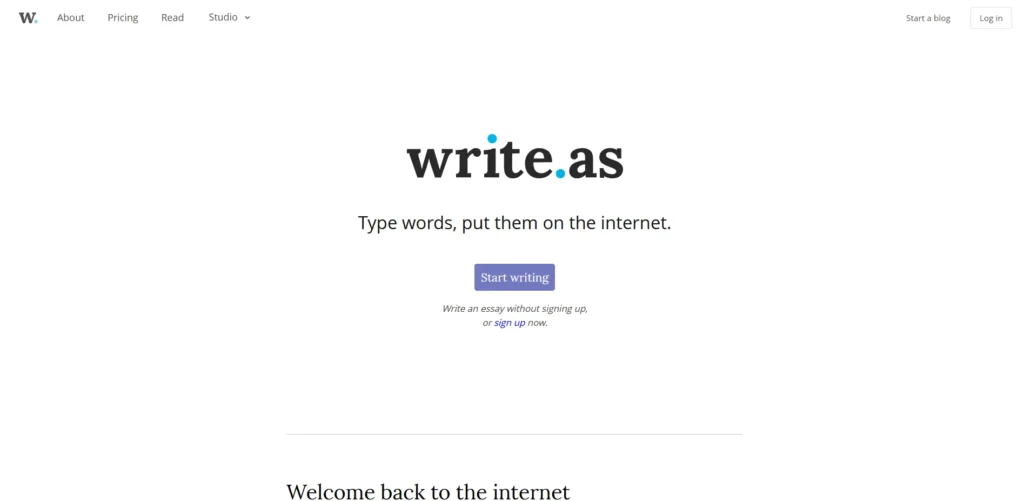
Write.as is a simple yet minimalist blogging service that targets writers who prefer to write more and be less distracted and to keep privacy. It enables writing and publishing of blog posts devoid of clutter, advertisement, and other non-essential designs. Write.as is great for folks who wish to write words only and use Markdown, it even provides the possibilities of anonymous publishing, so it seems exceptionally suitable as a journal, poetry and contemplation tool.
It is not required to create an account in order to publish, but the registered users will have a chance to manage several blogs, build custom URLs, and view a basic analytics. Write.as does not provide fancy functions or sophisticated tools but is fast, easy to use and offers privacy. Nevertheless, it does not come with sophisticated SEO tools, assists to monetize an initiative and it does not integrate into other services. Nevertheless, Write.as is an oasis of peace in an ocean of chaos when it comes to the other type of writers, those who simply need a place on the web to post a clean, focused writing.
Key Features:
- Clear, non distracted interface
- Provides opportunity of anonymous and account-based publishing
- Markdown formatting support
- The pages that were light and load fast
- No advertisement or pop ups
- Paid domains Features Custom domains
- Privacy-first approach
Pros:
- Very basic and very user-friendly
- To comment, no sign up is necessary
- Is concerned with direct writing experience
- Excellent personal journals
- Privacy-friendly and Unadvertised
Cons:
- Low degrees of customization
- No monetisation tools
- It does not have features of SEO optimization
- Templates with less design Minimal design templates
- Does not fare well as a brand builder or businesses
Pricing:
- Pro: $6/month
- Team: $25/ month
Also Explore: OTT Platforms
14. Typepad
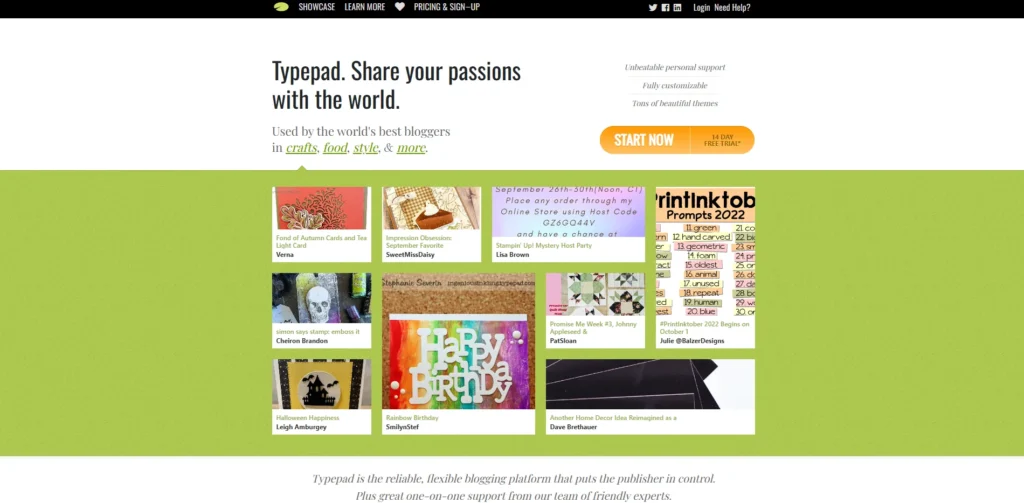
Typepad is a well established premium blogging resourcing with a long history since early 2000s, and with a clientele base targeting mostly the professional, small business, as well as the aging blogger. It is a fully hosted, stable and solid team with good customer support and necessary blogging tools. Typepad is clean, has WYSIWYG editor, inbuilt analytics and allows monetization on the platform by showing ads or using affiliate marketing. In contrast to the free platforms, it gives its users the opportunity to own their content and even map their own domain without much difficulty. It also allows being connected with Google Analytics and has a good supply of design templates.
But nevertheless, its functional capabilities and the design customizability seem old-fashioned in comparison with the modern hosting services, such as Squarespace or WordPress. It should suffice the needs of the not-so-tech-savvy crowd or bloggers who want fashionable features, but it would be a solid and highly reliable choice for people who need a blogging platform that requires little maintenance with proper business-level stability and ownership.
Key Features:
- Exclusive blogging service in full hosting and stability
- Mapping custom domain
- In-built monetization and advertisement help
- Adding Google Analytics
- Standard templates with customization
- The choices available are WYSIWYG and HTTP editors.
- Good customer care
Pros:
- Trustworthy and safe platform
- Outstanding customer service
- Custom domains ownership of content
- The following is simple to put in place and maintain.
- Ad and affiliate monetization was made possible
Cons:
- Free plan no Paid-only
- Obsolete interface and functions
- A small number of modern design templates
- Not so flexibility as newer ones
- Uncertainly and not popular in 2025
Pricing:
- Plus: $8.95/month or $89.50/year
- Unlimited: $14.95/month or 149.50/year
- Premium: $29.95/month or 299.50/year
- Enterprise: $49.95/month or 499.50/year
15. Drupal

Drupal is an attractive open-source content management system (CMS) that developers and enterprises use to create basic yet complex, and scalable websites—including blogs. It has unparalleled flexibility, modularity, and customization, and is perfectly suited to techie users or organizations requiring complex content structures and security. Among various blogging sites, Drupal stands out by permitting custom content types, taxonomy, and role-based users, making it a strong platform for structured content creation and management.
It is highly secure and performance-optimized, thus it has been mostly adopted by the governments, universities, and large media organizations. Drupal, however, is hard to learn and needs the understanding of PHP, HTML, and site structures. It cannot be quite as readily used as a plug and play solution Wix or Blogger, and generally requires a development team to set up. Nevertheless, it is a powerful, robust option of developers or organizations that want to add blogging to a wider digital experience.
Key Features:
- Open sourced and extremely configurable
- Advanced user and content management
- Powerful security and performance characteristics
- Thousands of extensions based modular structure
- URL and tagging system not only SEO-friendly The URL and tagging system in PayPal can also be said to be not only SEO friendly but also very big in size.
- The large traffic volume is scalable
- Multilingual and community assistance
Pros:
- Totally elastic and expandable
- Can also be used on complicated or business-level blogs
- Effective security prospects
- Fine-grained user rights Specification
- Community and active development
Cons:
- High business learning curve
- Has coding and technical requirement
- Not beginner-friendly
- Long-winded installation and repair
- Excessive to basic blogs
Pricing:
- No fee
Conclusion
The selection of the best blogging platforms is ultimately up to you and highly depends on your intent, technical know-how, and the type of content you plan to publish. WordPress.org is one of the best options for those seeking ultimate control and customization. Prefer something simple and uncomplicated? Then tools like Wix, Medium, or Substack are perfect for a quick start.
Web developers will prefer squarespace or weebly and tech savvy users might prefer performance by using ghost, jekyll or drupal. There exist platforms that are oriented to monetization, and those-to writing experience or community interaction. In knowing what specifically you need, whether SEO, freedom of design, or possibility of earning, you can turn towards a platform that both accommodates your content, but also makes your blog viable over the long run.
FAQs
1. What is the Simplest Blogging Platforms?
Wix and Blogger are the most suitable alternatives to beginners because of their easy-to-use interface.
2. Is Blogging About Them a Viable Way to Earn Money?
There are some free mediums such as Medium or Substack that can be monetized but up to a certain extent.
3. Which is the Best Blogging Platforms to Use in SEO?
WordPress.org and Ghost have advanced tools of SEO that can help improve the search engines visibility.
4. Does it Need to be Purchased in Hosting?
Separate hosting is only needed on self-hosted sites such as WordPress.org and Jekyll.
5. Where Can One do Long-Form Professional Writing?
LinkedIn Articles and medium articles would be excellent tools to publish quality-long-form content to a specific audience.
